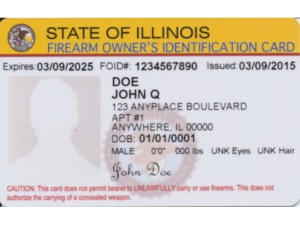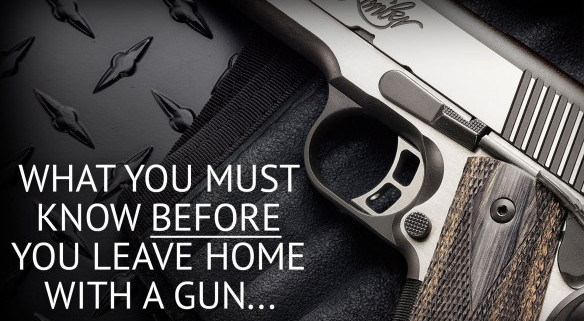Knowing the Illinois Gun Laws
Gun laws in Illinois
Gun laws in Illinois regulate the sale, possession, and use of firearms and ammunition in the state of Illinois in the United States.
To legally possess firearms or ammunition, Illinois residents must have a Firearm Owners Identification (FOID) card, which is issued by the Illinois State Police to any qualified applicant. Non-residents who may legally possess firearms in their home state are exempt from this requirement.
The state police issue licenses for the concealed carry of handguns to qualified applicants age 21 or older who pass a 16-hour training course. However, any law enforcement agency can object to an individual being granted a license “based upon a reasonable suspicion that the applicant is a danger to himself or herself or others, or a threat to public safety”. Objections are considered by a Concealed Carry Licensing Review Board, which decides whether or not the license will be issued, based on “a preponderance of the evidence”. Licenses issued by other states are not recognized, except for carry in a vehicle. Open carry is prohibited in most areas. Without a concealed carry license, a firearm must be unloaded and enclosed in a case when it is being transported.
There is a waiting period to take possession after purchasing a firearm — 72 hours for a handgun, or 24 hours for a rifle or shotgun. For private sales, the seller must verify the buyer’s FOID card, and keep a record of the sale for at least 10 years. Lost or stolen guns must be reported to the police. Possession of automatic firearms, short-barreled shotguns, or suppressors is prohibited. Possession of short-barreled rifles is permitted only for those who have an ATF Curios and Relics license or are a member of a military reenactment group.
Illinois has state preemption for certain areas of gun law, which invalidates the home rule guideline in those cases. Some local governments have enacted ordinances that are more restrictive than those of the state in areas not covered by state preemption.
FOID cards
To legally possess or purchase firearms or ammunition, Illinois residents must have a Firearm Owner’s Identification (FOID) card, which is issued by the Illinois State Police. The police must issue FOID cards to eligible applicants. An applicant is disqualified if he or she has been convicted of a felony or an act of domestic violence, is the subject of an order of protection, has been convicted of assault or battery or been a patient in a mental institution within the last five years, has been adjudicated as a mental defective, or is an illegal immigrant. There are additional requirements for applicants under the age of 21.
When a firearm is sold or transferred, the buyer is required to present their FOID card. This applies to private sales between individuals as well as to sales by Federal Firearms License (FFL) holders. For firearm sales by an FFL holder, or at a gun show, the seller must perform an automated dial-up check with the State Police, to verify that the FOID card is valid, and to redo the background check of the buyer. This additional checking is known as the Firearm Transfer Inquiry Program (FTIP). For private sales not at a gun show, the seller must also verify the buyer’s FOID card with the state police, and receive a transfer approval number, either via a web site or with a phone call.
The buyer is also required to present their FOID card when purchasing ammunition.
In 2011, in the case of People v. Holmes, the Illinois Supreme Court ruled that non-Illinois residents who are permitted to possess a firearm in their home state are not required to have an Illinois FOID card.
A FOID card does not authorize the carrying of a concealed firearm, but having a FOID card is a prerequisite for obtaining a concealed carry license.

Concealed and open carry
The Illinois State Police Department issues licenses for the concealed carry of handguns to qualified applicants age 21 or older who pass a 16-hour training course, the longest of any state. Illinois law says that the state police “shall issue” a license to a qualified applicant. However, any law enforcement agency can object to an individual being granted a license “based upon a reasonable suspicion that the applicant is a danger to himself or herself or others, or a threat to public safety”. Objections are considered by a Concealed Carry Licensing Review Board, which decides whether or not the license will be issued, based on “a preponderance of the evidence”. Under revised rules implemented in July 2014, the Review Board notifies the applicant by mail of the basis of the objection and identifies the agency that brought it.
In order to apply for a license the applicant must have in their possession the certificate from the required training, a valid driver’s license or state ID card, a valid FOID card, a head and shoulder electronic photograph taken in the last 30 days, ten years of documented residency, fingerprints (optional, but submitting an application without prints increases the potential processing time from 90 to 120 days), and the application fee.
Permits cost $150 for residents or $300 for non-residents, and are valid for five years. Non-residents may apply if their state is on a list of states with “substantially similar” carry permitting laws; currently only Hawaii, New Mexico, South Carolina, and Virginia qualify. Concealed carry permits or licenses issued by other states are not recognized, except that non-residents in possession of a carry permit or license from their home state may carry in a vehicle while traveling through Illinois.
Concealed carry is prohibited on public transportation, at a bar or restaurant that gets more than half its revenue from the sale of alcohol, at a public gathering or special event that requires a permit (e.g. a street fair or festival), at a place where alcohol is sold for special events, and on private property where the owner has chosen not to allow it (and, unless the property is a private residence, has posted an appropriate sign). Concealed carry is also not allowed at any school, college or university, preschool or daycare facility, government building, courthouse, prison, jail, detention facility, hospital, playground, park, Cook County Forest Preserve area, stadium or arena for college or professional sports, amusement park, riverboat casino, off-track betting facility, library, zoo, museum, airport, nuclear facility, or place where firearms are prohibited under federal law. However, concealed carry license holders who are in the parking lot of a prohibited location (except a nuclear facility) are allowed to carry a concealed firearm when they are in their vehicle, and to store their gun locked in their vehicle and out of plain view.
In accordance with federal law, persons who have been convicted of a felony, or of a misdemeanor act of domestic violence, are ineligible to receive a concealed carry license. In Illinois persons who, within the last five years, have been convicted of a misdemeanor involving the use of force or violence, or received two convictions for driving under the influence of alcohol or drugs, or been in residential or court-ordered treatment for substance abuse, are also ineligible to receive a license. There are other conditions that make an applicant ineligible under state law, including having been a patient in a mental health facility in the last five years.
In compliance with the federal Law Enforcement Officers Safety Act, retired police officers who qualify annually under state guidelines are allowed to carry concealed.
Open carry of firearms is generally illegal, except when hunting, or in a fixed place of business with the owner’s permission, or in one’s abode.
Without a concealed carry license, a firearm must be unloaded and enclosed in a case when it is being transported.




